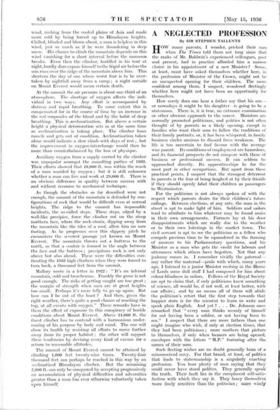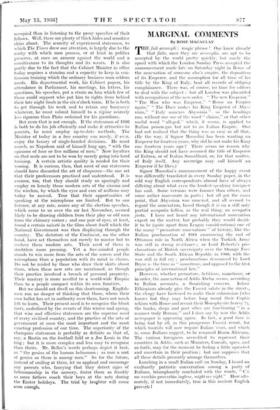A NEGLECTED PROFESSION
By SIR STEPHEN TALLENTS
HOW many parents, I wonder, pricked their ears when The Times told them not long since that the ranks of Mr. Baldwin's experienced colleagues, past and present, had in practice affcirded him a narrow choice in his appointment of a new Minister? Some, at least, must have asked themselves whether here, in the profession of Minister of the Crown, might not be an unexpected opening for their children. The more confident among them, I suspect, wondered fleetingly whether here might not have been an opportunity for themselves.
How rarely does one hear a father say that his son— or nowadays it might be his daughter—is going to be a statesman. There is, it is true, no entrance examination or other obvious approach to the career. Ministers are normally promoted politicians, and politics is not often thought of by parents as a likely opening, except in families who want their sons to follow the traditions of their family portraits, or, it has been whispered, in family business circles anxious to discard from weakness. The life is too uncertain to find favour with the average wise parent. Its conditions of employment are hazardous, and its financial prospects do not compare with those of business or professional success. It can seldom be approached directly. Its apprenticeships lie for the most part in other occupations. But apart from these practical points, I suspect that the strongest deterrent to parents is the fear of being laughed at by their friedds if they should openly label their children as passengers to Westminster.
For the politician is not always spoken of with the respect which parents desire for their children's future callings. Between elections, at any rate, the man in the street is apt to make light of him. Soldiers and sailors tend to attribute to him whatever may be found amiss in their own arrangements. Farmers lay at his door disappointments which are really due to the weather or to their own loiterings in the market town. The civil servant is apt to. see the politician as a fellow who compels precious time to be squandered in the framing of answers to his Parliamentary questions, and his Minister as a man who gets the credit for labours and utterances which others have begotten. Not that any jealousy comes in. I remember vividly the paternal— nay rather the maternal—pride with which, many years ago, I listened to a junior Minister reciting in the House of Lords some dull stuff I had composed for him about colour-blindness in sailors. Fellows of the Royal Society. are apt to claim that, if only politicians knew something of science, all would be, if not well, at feast better, with our affairs ; and by no means all of them will abide the politician's retort that the first step towards that happier state is for the scientist to learn to write and speak plain English. And yet ? . . . Dr. Johnson once remarked that " every man thinks meanly of himself for not having been a soldier, or not having been to sea." I suspect that there are more fathers than that might imagine who wish, if only at election times, that they had been politicians ; more mothers that picture to themselves, if only when bazaars are being opened, envelopes with the letters " M.P." featuring after the names of their sons.
Such fleeting wishes are no doubt generally born of a misconceived envy. For that brand, at least, of politics that leads to statesmanship is a singularly exacting profession. You hear plenty of men saying that they could never have stood politics. They generally speak the truth. Their fault lies in the complacent self-satis- faction with which they say it. They fancy themselves. more finely sensitive than the politician ; more wisely occupied- than in listening to the prosy speeches of their fellows. Well, there are plenty of thick hides and sensitive skins about. The scarcity of experienced statesmen, to which The Times drew our attention, is largely due to the rarity with which men possess, or at least in politics preserve, at once an armour against the world and a sensitiveness to its thoughts and its wants. It is also partly due to the fact that the Cabinet Minister in office today requires a stamina and a capacity to keep in con- tinuous training which the ordinary business man seldom needs. His departmental work, his Cabinet papers, his attendance in Parliament, his meetings, his letters, his questions, his speeches, put a strain on him which few of those could support who put him to rights from behind their late night finals in the six o'clock train. If he is both to get through his work and to retain any buoyancy whatever, he must submit himself to a regime scarcely less rigorous than Plato ordained for his guardians.
But even that is not enough. If the statesman of 1936 is both to do his job efficiently and make it attractive to parents,, he must employ up-to-date methods. The Minister of today in a free country can rarely, if ever, enjoy the luxury of single-handed decisions. He must march, as Napoleon said of himself long ago, " with the opinions'of four or five millions of men." Now loyalties on that scale are not to be won by merely going into hard training. A certain artistic quality 'is needed for their wooing. It is curious, then, that most of our statesmen should have discarded the art of eloquence—the one art that their predecessors practised and understood. It is curious, too, that they should study so sparingly and employ so lamely those modern arts of the cinema and the wireless, by which the eyes and ears of millions may today be moved. True that their opportunities of speaking at the microphone are limited. But to one listener, at any rate, scarce any of the election speeches, which came to us over the air last November, seethed likely to be drawing children from their play or old men from the chimney corner ; and one pair of eyes, at least, found a certain naiveté in the films about itself which the National Government was then displaying through the country. The dictators of the Continent, on the other hand, have set themselves not merely to master but to enslave these modern arts. Their need of them is dottbtleSS• more pressing: Yet a free-Minded people stands to win more frcim the arts of the screen and the microphone than a population with its mind in chains. Do not be misled by those who draw their skirts about them, when these new arts are mentioned, as though their practice involved a breach of personal propriety. Their mastery is more needful to a world-wide Empire than to a people compact within its own frontiers.
But we should not dwell on this shortcoming. English- men run no danger of thinking that those, whom their own ballot has set in authority over them, have not much left to learn. Their present need is to recognise the blunt facts, underlined by the events of this winter and spring, that wise and effective statesmen are the supreme need of every civilised country, and the practice of the arts of government at once the most important and the most exacting profession of our time. The superiority of the champion statesman is probably as definite as that of, say, a Bastin on the football field or a Joe Louis in the ring ; but it is more complex and less easy to recognise than theirs. Mr. Belloc's words perhaps depict it best, as " the genius of the human helmsman ; as rare a sort of genius as there is among men." So for the future, instead of smiling at them, let us applaud and encourage any parents who, fancying that they detect signs of helmsmanship in the nursery, foster them as frankly as some fathers coach their boys at the nets during the Easter holidays. The trial by laughter will come soon enough.























































 Previous page
Previous page